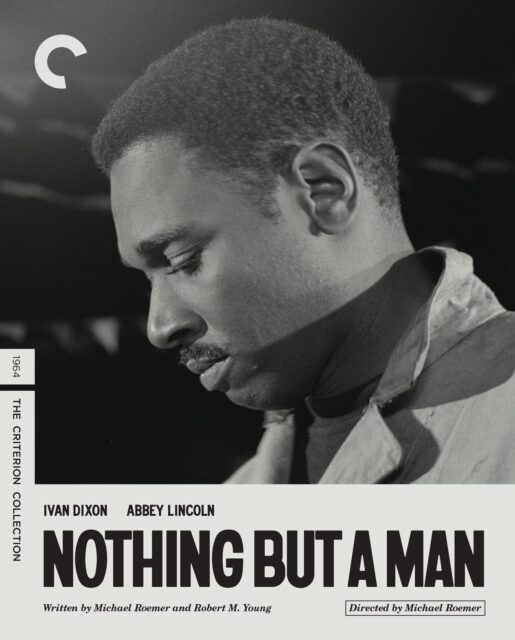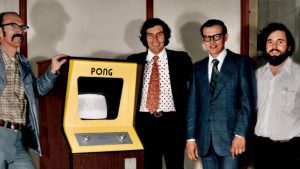
The post Home Video Hovel: Nothing but a Man, by Scott Nye appeared first on Battleship Pretension.
Due to the very nature of the conflict worth exploring, there’s an unfortunate dearth of contemporaneous fiction films made about the Black experience in Jim Crow, pre-Civil Rights Act America. Few white filmmakers wanted to touch it. Fewer Black filmmakers had the resources to make a film at all. That’s even before you try to find an audience. It was tough enough to get a film through that directly addressed racism, and that often required some degree of assuaging the guilt of a white liberal audience; quite another to show the everyday lives struggling and suffering under it.
Nothing but a Man’s Duff Anderson (Ivan Dixon) is one such man. An itinerant railroad worker, he earns a good union wage and doesn’t have to rest anywhere long enough to gather any moss. Feeling like he needs something different from the usual pool and booze on his night off, he wanders into a church meeting; good food, good music. Not so far away from how he’d like to spend his time. Plus the preacher’s daughter, a schoolteacher named Josie (Abbey Lincoln), is quite friendly and quite pretty. Against everyone’s better judgment, they start to go out, and start becoming more attached than their very different upbringings can seem to allow.
Once he gets attached, Duff finds the grim side of settling anywhere, but particularly settling in rural Alabama. He gets a job all right, but at a much lower wage than he’s used to, and none of the other Black men want to organize for better pay. Once word starts getting around about him, it becomes harder for him to find work at all. For the first time in his life, he’s known, he’s loved, and he’s establishing roots, but being known cuts both ways. In a society set up to keep men like him on the margins or out of town entirely, what hope does he have of finding any real sense of pride and worth? Of being part of a community? Or is he better off simply being an individual?
Dixon was a vital figure at the time, both as an actor on stage and screen, and eventually as a director of television. Between the two, he made two key “blaxploitation” films, the straightforward crime thriller Trouble Man and the still-incendiary The Spook Who Sat By the Door. In some ways, these poles are relevant to the character of Duff, a man whose domestic ambitions require revolutionary instincts. Dixon plays him measured, restrained, with hints in the action that he could explode at any moment, so every beat of silence between him and some territorial white man represents a series of internal decisions we can only guess at. He’s so charismatic it’s no wonder Josie goes for him, and so stubborn it’s no wonder her father can’t stand him. Perhaps boldest of all, especially for a film by a white filmmaker sympathetic to Duff and people in his position, the film shows both how Duff is the victim and perpetrator of his own discontent.
Writer/director/producer Michael Roemer is quick to point out that the script was informed by the deep research he did in the South (where, as a liberal German-accented Jew, he was nearly as unwelcome as the Black residents), but also by his own upbringing in Nazi Germany, watching his father thrown from job to job and town to town due to bigotry that could never be satisfied. The film inherits a lot of its texture and pacing from Italian neorealism, approaching its setting honestly, realistically, and recognizably. One of that movement’s most famous works – Bicycle Thieves – would complement this film well on a double bill for its own perceptiveness in the cycle of suffering they each explore.
As with Roemer’s The Plot Against Harry, Nothing but a Man went through a period of unavailability following its debut in the mid-1960s until a revival in the 1990s, again falling a bit out of circulation before being brought back to life today. The Plot Against Harry enjoyed popular runs in art-house theaters last year, and one imagines a digital version forthcoming, while Nothing but a Man is making its Blu-ray debut thanks to The Criterion Collection. The high-definition image, struck from the original camera negative and restored in 4K, looks spectacular, virtually free of any obvious damage, scratches, or wear. It exhibits strong contrast, and even small patterns of clothing, fabric, wood, and dust come through cleanly with no compression artifacts, banding, or anything of the sort.
Supplements are few but really engaging, beginning with a brand-new interview with Roemer, who, at 96, is sharply engaging in recollecting his career, how he got to Nothing but a Man, and where it took him. He’s self-deprecating and lively, while also humbly reflective on how the culture has changed, and why he would probably hesitate to make a film about the Black experience today. Next up are a pair of features with interviews filmed in 2004, presumably for an older DVD release, though they are credited to Criterion so I’m not sure of the lineage. Nevertheless, getting to hear from cowriter, cinematographer, and producer Robert M. Young, as well as actors Dixon, Lincoln, and Harris, while they were all still alive, is a genuine pleasure, with all noting how unusual and exceptional the experience of making the film was. The release is capped off with a sharp and comprehensive essay by critic Gene Seymour, presented in a foldout insert.
I confess I had either never heard of or forgotten about Nothing but a Man before Criterion announced it, but it’s representative of the important work they do spotlighting undersung and underrepresented classics in the vast scope of film history. Their release is more than satisfactory in drawing together available resources to help bolster its place within the canon, and is easy to recommend.
The post Home Video Hovel: Nothing but a Man, by Scott Nye first appeared on Battleship Pretension.
The post Home Video Hovel: Nothing but a Man, by Scott Nye appeared first on Battleship Pretension.






